Case Study on Bioethics
VerifiedAdded on 2023/01/04
|8
|2806
|47
AI Summary
This essay outlines a case study on bioethics, examining the legal and ethical considerations and responsibilities of nurses in providing contraception education. It discusses the violation of ethical and legal laws and provides suggestions for solutions.
Contribute Materials
Your contribution can guide someone’s learning journey. Share your
documents today.
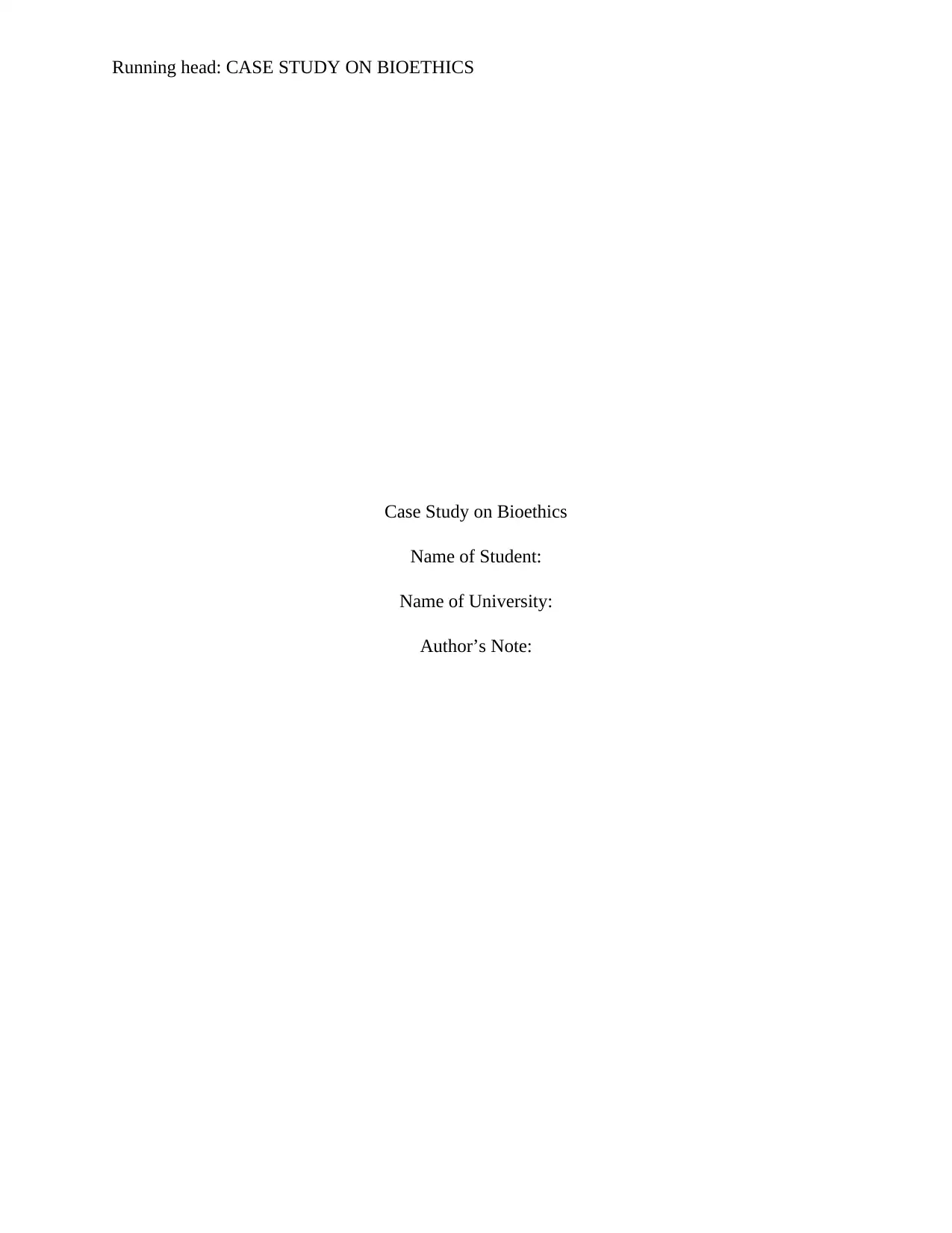
Running head: CASE STUDY ON BIOETHICS
Case Study on Bioethics
Name of Student:
Name of University:
Author’s Note:
Case Study on Bioethics
Name of Student:
Name of University:
Author’s Note:
Secure Best Marks with AI Grader
Need help grading? Try our AI Grader for instant feedback on your assignments.
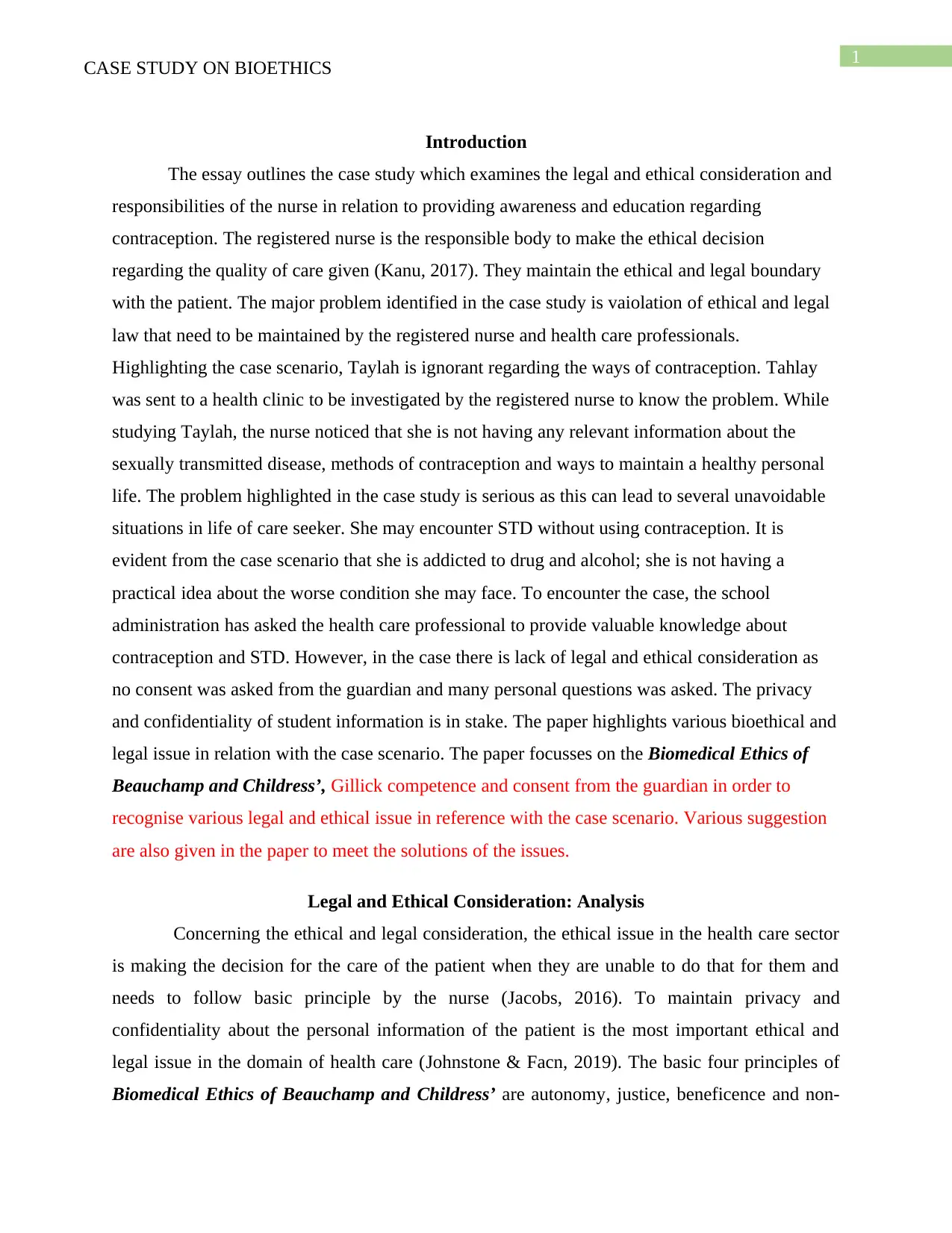
1
CASE STUDY ON BIOETHICS
Introduction
The essay outlines the case study which examines the legal and ethical consideration and
responsibilities of the nurse in relation to providing awareness and education regarding
contraception. The registered nurse is the responsible body to make the ethical decision
regarding the quality of care given (Kanu, 2017). They maintain the ethical and legal boundary
with the patient. The major problem identified in the case study is vaiolation of ethical and legal
law that need to be maintained by the registered nurse and health care professionals.
Highlighting the case scenario, Taylah is ignorant regarding the ways of contraception. Tahlay
was sent to a health clinic to be investigated by the registered nurse to know the problem. While
studying Taylah, the nurse noticed that she is not having any relevant information about the
sexually transmitted disease, methods of contraception and ways to maintain a healthy personal
life. The problem highlighted in the case study is serious as this can lead to several unavoidable
situations in life of care seeker. She may encounter STD without using contraception. It is
evident from the case scenario that she is addicted to drug and alcohol; she is not having a
practical idea about the worse condition she may face. To encounter the case, the school
administration has asked the health care professional to provide valuable knowledge about
contraception and STD. However, in the case there is lack of legal and ethical consideration as
no consent was asked from the guardian and many personal questions was asked. The privacy
and confidentiality of student information is in stake. The paper highlights various bioethical and
legal issue in relation with the case scenario. The paper focusses on the Biomedical Ethics of
Beauchamp and Childress’, Gillick competence and consent from the guardian in order to
recognise various legal and ethical issue in reference with the case scenario. Various suggestion
are also given in the paper to meet the solutions of the issues.
Legal and Ethical Consideration: Analysis
Concerning the ethical and legal consideration, the ethical issue in the health care sector
is making the decision for the care of the patient when they are unable to do that for them and
needs to follow basic principle by the nurse (Jacobs, 2016). To maintain privacy and
confidentiality about the personal information of the patient is the most important ethical and
legal issue in the domain of health care (Johnstone & Facn, 2019). The basic four principles of
Biomedical Ethics of Beauchamp and Childress’ are autonomy, justice, beneficence and non-
CASE STUDY ON BIOETHICS
Introduction
The essay outlines the case study which examines the legal and ethical consideration and
responsibilities of the nurse in relation to providing awareness and education regarding
contraception. The registered nurse is the responsible body to make the ethical decision
regarding the quality of care given (Kanu, 2017). They maintain the ethical and legal boundary
with the patient. The major problem identified in the case study is vaiolation of ethical and legal
law that need to be maintained by the registered nurse and health care professionals.
Highlighting the case scenario, Taylah is ignorant regarding the ways of contraception. Tahlay
was sent to a health clinic to be investigated by the registered nurse to know the problem. While
studying Taylah, the nurse noticed that she is not having any relevant information about the
sexually transmitted disease, methods of contraception and ways to maintain a healthy personal
life. The problem highlighted in the case study is serious as this can lead to several unavoidable
situations in life of care seeker. She may encounter STD without using contraception. It is
evident from the case scenario that she is addicted to drug and alcohol; she is not having a
practical idea about the worse condition she may face. To encounter the case, the school
administration has asked the health care professional to provide valuable knowledge about
contraception and STD. However, in the case there is lack of legal and ethical consideration as
no consent was asked from the guardian and many personal questions was asked. The privacy
and confidentiality of student information is in stake. The paper highlights various bioethical and
legal issue in relation with the case scenario. The paper focusses on the Biomedical Ethics of
Beauchamp and Childress’, Gillick competence and consent from the guardian in order to
recognise various legal and ethical issue in reference with the case scenario. Various suggestion
are also given in the paper to meet the solutions of the issues.
Legal and Ethical Consideration: Analysis
Concerning the ethical and legal consideration, the ethical issue in the health care sector
is making the decision for the care of the patient when they are unable to do that for them and
needs to follow basic principle by the nurse (Jacobs, 2016). To maintain privacy and
confidentiality about the personal information of the patient is the most important ethical and
legal issue in the domain of health care (Johnstone & Facn, 2019). The basic four principles of
Biomedical Ethics of Beauchamp and Childress’ are autonomy, justice, beneficence and non-
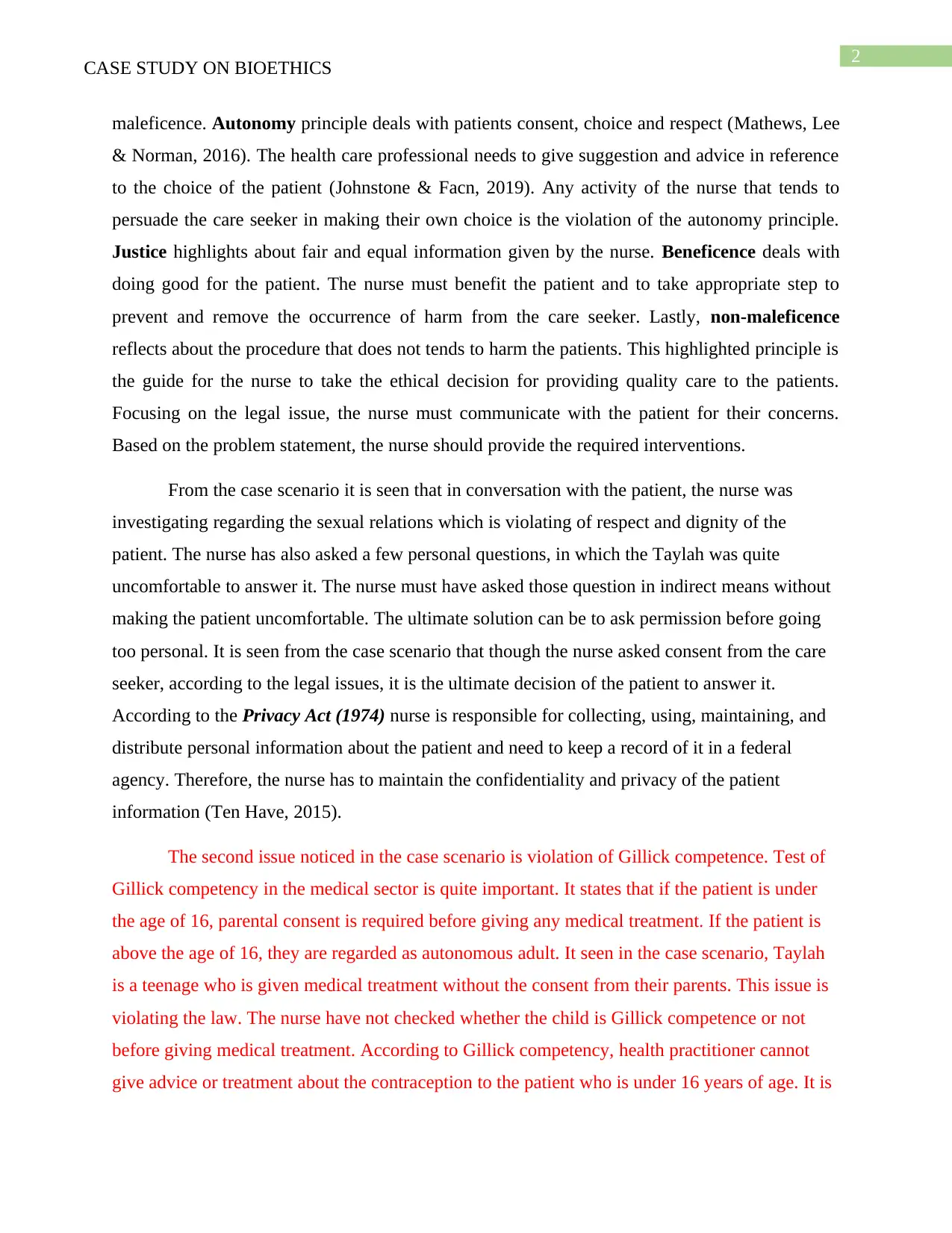
2
CASE STUDY ON BIOETHICS
maleficence. Autonomy principle deals with patients consent, choice and respect (Mathews, Lee
& Norman, 2016). The health care professional needs to give suggestion and advice in reference
to the choice of the patient (Johnstone & Facn, 2019). Any activity of the nurse that tends to
persuade the care seeker in making their own choice is the violation of the autonomy principle.
Justice highlights about fair and equal information given by the nurse. Beneficence deals with
doing good for the patient. The nurse must benefit the patient and to take appropriate step to
prevent and remove the occurrence of harm from the care seeker. Lastly, non-maleficence
reflects about the procedure that does not tends to harm the patients. This highlighted principle is
the guide for the nurse to take the ethical decision for providing quality care to the patients.
Focusing on the legal issue, the nurse must communicate with the patient for their concerns.
Based on the problem statement, the nurse should provide the required interventions.
From the case scenario it is seen that in conversation with the patient, the nurse was
investigating regarding the sexual relations which is violating of respect and dignity of the
patient. The nurse has also asked a few personal questions, in which the Taylah was quite
uncomfortable to answer it. The nurse must have asked those question in indirect means without
making the patient uncomfortable. The ultimate solution can be to ask permission before going
too personal. It is seen from the case scenario that though the nurse asked consent from the care
seeker, according to the legal issues, it is the ultimate decision of the patient to answer it.
According to the Privacy Act (1974) nurse is responsible for collecting, using, maintaining, and
distribute personal information about the patient and need to keep a record of it in a federal
agency. Therefore, the nurse has to maintain the confidentiality and privacy of the patient
information (Ten Have, 2015).
The second issue noticed in the case scenario is violation of Gillick competence. Test of
Gillick competency in the medical sector is quite important. It states that if the patient is under
the age of 16, parental consent is required before giving any medical treatment. If the patient is
above the age of 16, they are regarded as autonomous adult. It seen in the case scenario, Taylah
is a teenage who is given medical treatment without the consent from their parents. This issue is
violating the law. The nurse have not checked whether the child is Gillick competence or not
before giving medical treatment. According to Gillick competency, health practitioner cannot
give advice or treatment about the contraception to the patient who is under 16 years of age. It is
CASE STUDY ON BIOETHICS
maleficence. Autonomy principle deals with patients consent, choice and respect (Mathews, Lee
& Norman, 2016). The health care professional needs to give suggestion and advice in reference
to the choice of the patient (Johnstone & Facn, 2019). Any activity of the nurse that tends to
persuade the care seeker in making their own choice is the violation of the autonomy principle.
Justice highlights about fair and equal information given by the nurse. Beneficence deals with
doing good for the patient. The nurse must benefit the patient and to take appropriate step to
prevent and remove the occurrence of harm from the care seeker. Lastly, non-maleficence
reflects about the procedure that does not tends to harm the patients. This highlighted principle is
the guide for the nurse to take the ethical decision for providing quality care to the patients.
Focusing on the legal issue, the nurse must communicate with the patient for their concerns.
Based on the problem statement, the nurse should provide the required interventions.
From the case scenario it is seen that in conversation with the patient, the nurse was
investigating regarding the sexual relations which is violating of respect and dignity of the
patient. The nurse has also asked a few personal questions, in which the Taylah was quite
uncomfortable to answer it. The nurse must have asked those question in indirect means without
making the patient uncomfortable. The ultimate solution can be to ask permission before going
too personal. It is seen from the case scenario that though the nurse asked consent from the care
seeker, according to the legal issues, it is the ultimate decision of the patient to answer it.
According to the Privacy Act (1974) nurse is responsible for collecting, using, maintaining, and
distribute personal information about the patient and need to keep a record of it in a federal
agency. Therefore, the nurse has to maintain the confidentiality and privacy of the patient
information (Ten Have, 2015).
The second issue noticed in the case scenario is violation of Gillick competence. Test of
Gillick competency in the medical sector is quite important. It states that if the patient is under
the age of 16, parental consent is required before giving any medical treatment. If the patient is
above the age of 16, they are regarded as autonomous adult. It seen in the case scenario, Taylah
is a teenage who is given medical treatment without the consent from their parents. This issue is
violating the law. The nurse have not checked whether the child is Gillick competence or not
before giving medical treatment. According to Gillick competency, health practitioner cannot
give advice or treatment about the contraception to the patient who is under 16 years of age. It is
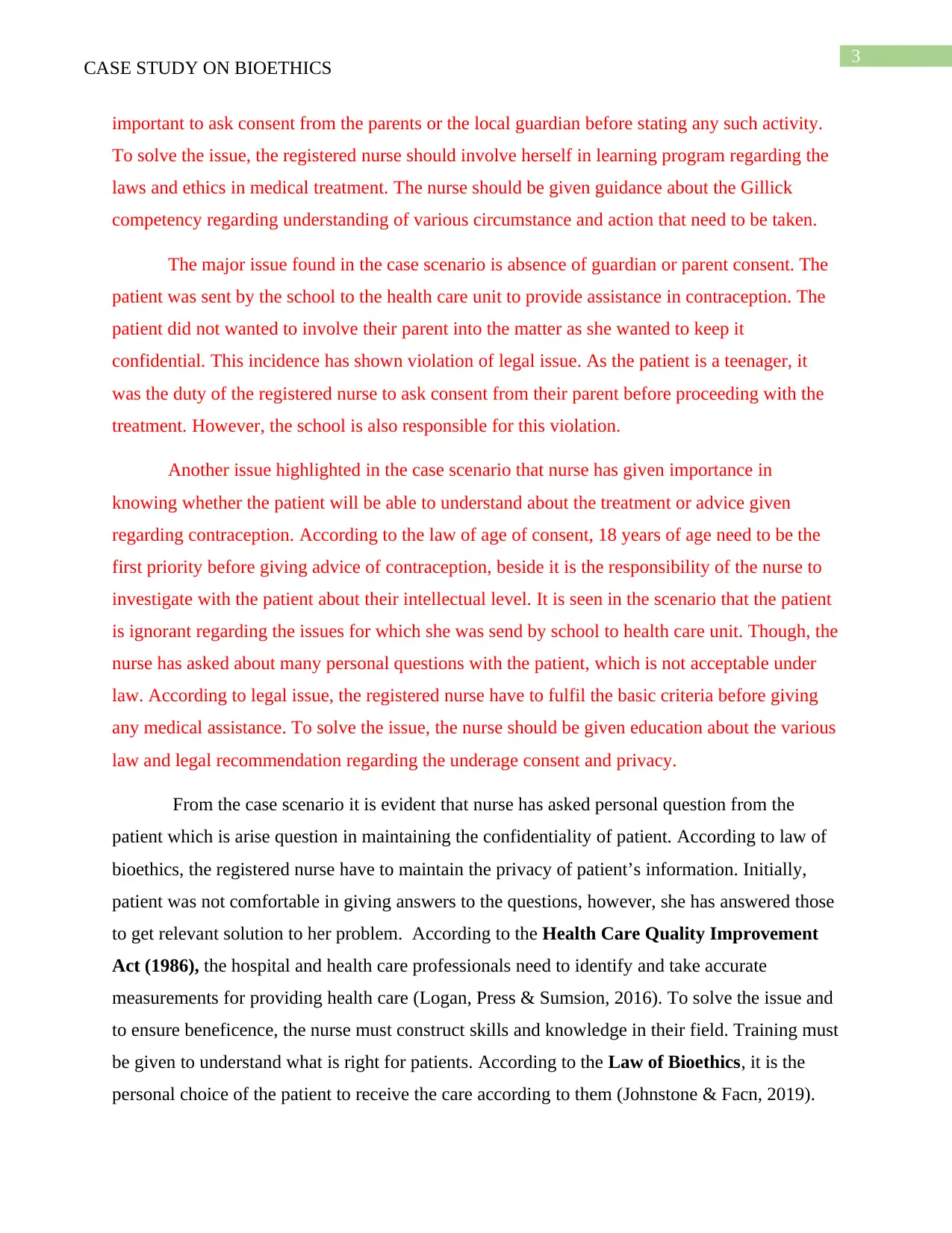
3
CASE STUDY ON BIOETHICS
important to ask consent from the parents or the local guardian before stating any such activity.
To solve the issue, the registered nurse should involve herself in learning program regarding the
laws and ethics in medical treatment. The nurse should be given guidance about the Gillick
competency regarding understanding of various circumstance and action that need to be taken.
The major issue found in the case scenario is absence of guardian or parent consent. The
patient was sent by the school to the health care unit to provide assistance in contraception. The
patient did not wanted to involve their parent into the matter as she wanted to keep it
confidential. This incidence has shown violation of legal issue. As the patient is a teenager, it
was the duty of the registered nurse to ask consent from their parent before proceeding with the
treatment. However, the school is also responsible for this violation.
Another issue highlighted in the case scenario that nurse has given importance in
knowing whether the patient will be able to understand about the treatment or advice given
regarding contraception. According to the law of age of consent, 18 years of age need to be the
first priority before giving advice of contraception, beside it is the responsibility of the nurse to
investigate with the patient about their intellectual level. It is seen in the scenario that the patient
is ignorant regarding the issues for which she was send by school to health care unit. Though, the
nurse has asked about many personal questions with the patient, which is not acceptable under
law. According to legal issue, the registered nurse have to fulfil the basic criteria before giving
any medical assistance. To solve the issue, the nurse should be given education about the various
law and legal recommendation regarding the underage consent and privacy.
From the case scenario it is evident that nurse has asked personal question from the
patient which is arise question in maintaining the confidentiality of patient. According to law of
bioethics, the registered nurse have to maintain the privacy of patient’s information. Initially,
patient was not comfortable in giving answers to the questions, however, she has answered those
to get relevant solution to her problem. According to the Health Care Quality Improvement
Act (1986), the hospital and health care professionals need to identify and take accurate
measurements for providing health care (Logan, Press & Sumsion, 2016). To solve the issue and
to ensure beneficence, the nurse must construct skills and knowledge in their field. Training must
be given to understand what is right for patients. According to the Law of Bioethics, it is the
personal choice of the patient to receive the care according to them (Johnstone & Facn, 2019).
CASE STUDY ON BIOETHICS
important to ask consent from the parents or the local guardian before stating any such activity.
To solve the issue, the registered nurse should involve herself in learning program regarding the
laws and ethics in medical treatment. The nurse should be given guidance about the Gillick
competency regarding understanding of various circumstance and action that need to be taken.
The major issue found in the case scenario is absence of guardian or parent consent. The
patient was sent by the school to the health care unit to provide assistance in contraception. The
patient did not wanted to involve their parent into the matter as she wanted to keep it
confidential. This incidence has shown violation of legal issue. As the patient is a teenager, it
was the duty of the registered nurse to ask consent from their parent before proceeding with the
treatment. However, the school is also responsible for this violation.
Another issue highlighted in the case scenario that nurse has given importance in
knowing whether the patient will be able to understand about the treatment or advice given
regarding contraception. According to the law of age of consent, 18 years of age need to be the
first priority before giving advice of contraception, beside it is the responsibility of the nurse to
investigate with the patient about their intellectual level. It is seen in the scenario that the patient
is ignorant regarding the issues for which she was send by school to health care unit. Though, the
nurse has asked about many personal questions with the patient, which is not acceptable under
law. According to legal issue, the registered nurse have to fulfil the basic criteria before giving
any medical assistance. To solve the issue, the nurse should be given education about the various
law and legal recommendation regarding the underage consent and privacy.
From the case scenario it is evident that nurse has asked personal question from the
patient which is arise question in maintaining the confidentiality of patient. According to law of
bioethics, the registered nurse have to maintain the privacy of patient’s information. Initially,
patient was not comfortable in giving answers to the questions, however, she has answered those
to get relevant solution to her problem. According to the Health Care Quality Improvement
Act (1986), the hospital and health care professionals need to identify and take accurate
measurements for providing health care (Logan, Press & Sumsion, 2016). To solve the issue and
to ensure beneficence, the nurse must construct skills and knowledge in their field. Training must
be given to understand what is right for patients. According to the Law of Bioethics, it is the
personal choice of the patient to receive the care according to them (Johnstone & Facn, 2019).
Secure Best Marks with AI Grader
Need help grading? Try our AI Grader for instant feedback on your assignments.
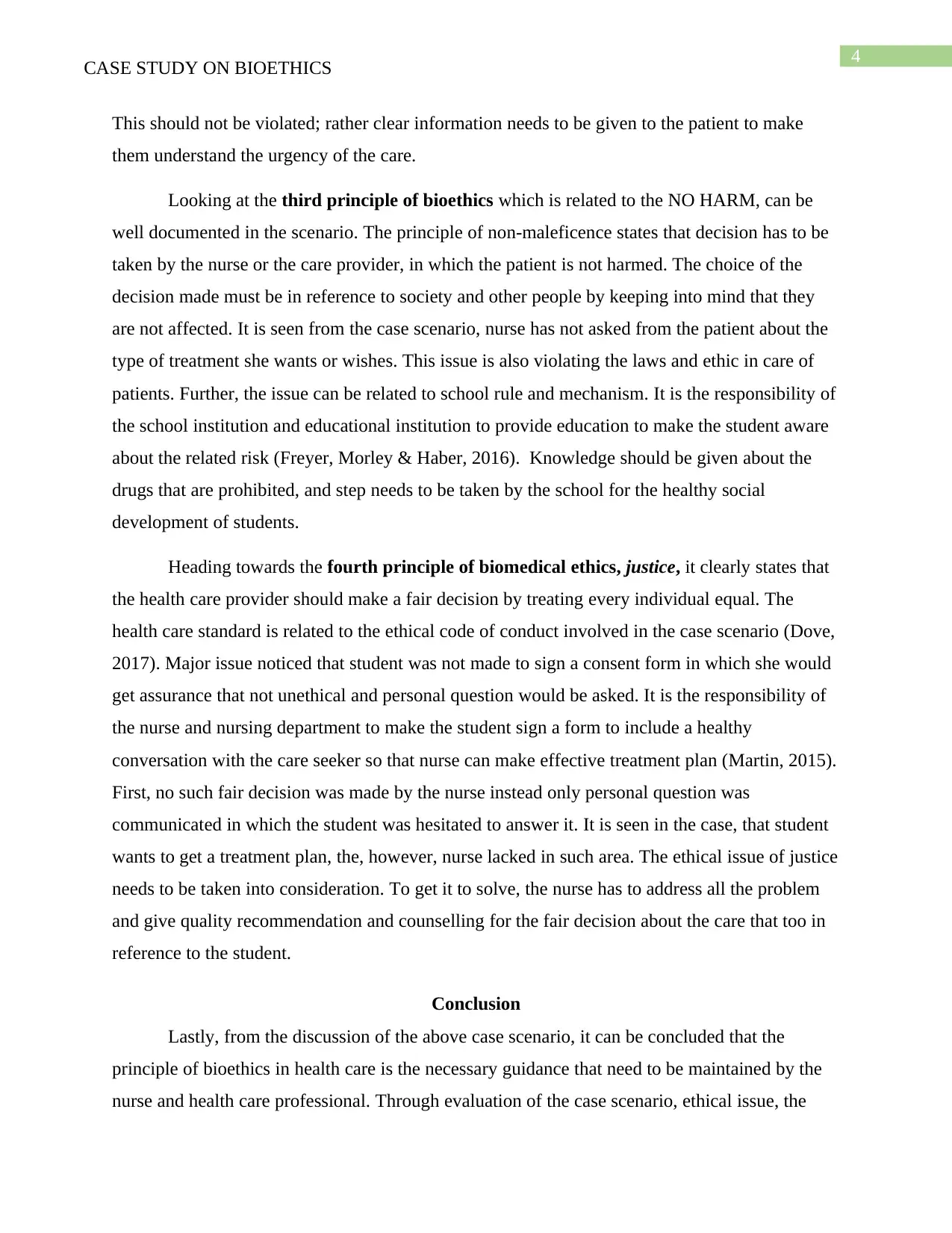
4
CASE STUDY ON BIOETHICS
This should not be violated; rather clear information needs to be given to the patient to make
them understand the urgency of the care.
Looking at the third principle of bioethics which is related to the NO HARM, can be
well documented in the scenario. The principle of non-maleficence states that decision has to be
taken by the nurse or the care provider, in which the patient is not harmed. The choice of the
decision made must be in reference to society and other people by keeping into mind that they
are not affected. It is seen from the case scenario, nurse has not asked from the patient about the
type of treatment she wants or wishes. This issue is also violating the laws and ethic in care of
patients. Further, the issue can be related to school rule and mechanism. It is the responsibility of
the school institution and educational institution to provide education to make the student aware
about the related risk (Freyer, Morley & Haber, 2016). Knowledge should be given about the
drugs that are prohibited, and step needs to be taken by the school for the healthy social
development of students.
Heading towards the fourth principle of biomedical ethics, justice, it clearly states that
the health care provider should make a fair decision by treating every individual equal. The
health care standard is related to the ethical code of conduct involved in the case scenario (Dove,
2017). Major issue noticed that student was not made to sign a consent form in which she would
get assurance that not unethical and personal question would be asked. It is the responsibility of
the nurse and nursing department to make the student sign a form to include a healthy
conversation with the care seeker so that nurse can make effective treatment plan (Martin, 2015).
First, no such fair decision was made by the nurse instead only personal question was
communicated in which the student was hesitated to answer it. It is seen in the case, that student
wants to get a treatment plan, the, however, nurse lacked in such area. The ethical issue of justice
needs to be taken into consideration. To get it to solve, the nurse has to address all the problem
and give quality recommendation and counselling for the fair decision about the care that too in
reference to the student.
Conclusion
Lastly, from the discussion of the above case scenario, it can be concluded that the
principle of bioethics in health care is the necessary guidance that need to be maintained by the
nurse and health care professional. Through evaluation of the case scenario, ethical issue, the
CASE STUDY ON BIOETHICS
This should not be violated; rather clear information needs to be given to the patient to make
them understand the urgency of the care.
Looking at the third principle of bioethics which is related to the NO HARM, can be
well documented in the scenario. The principle of non-maleficence states that decision has to be
taken by the nurse or the care provider, in which the patient is not harmed. The choice of the
decision made must be in reference to society and other people by keeping into mind that they
are not affected. It is seen from the case scenario, nurse has not asked from the patient about the
type of treatment she wants or wishes. This issue is also violating the laws and ethic in care of
patients. Further, the issue can be related to school rule and mechanism. It is the responsibility of
the school institution and educational institution to provide education to make the student aware
about the related risk (Freyer, Morley & Haber, 2016). Knowledge should be given about the
drugs that are prohibited, and step needs to be taken by the school for the healthy social
development of students.
Heading towards the fourth principle of biomedical ethics, justice, it clearly states that
the health care provider should make a fair decision by treating every individual equal. The
health care standard is related to the ethical code of conduct involved in the case scenario (Dove,
2017). Major issue noticed that student was not made to sign a consent form in which she would
get assurance that not unethical and personal question would be asked. It is the responsibility of
the nurse and nursing department to make the student sign a form to include a healthy
conversation with the care seeker so that nurse can make effective treatment plan (Martin, 2015).
First, no such fair decision was made by the nurse instead only personal question was
communicated in which the student was hesitated to answer it. It is seen in the case, that student
wants to get a treatment plan, the, however, nurse lacked in such area. The ethical issue of justice
needs to be taken into consideration. To get it to solve, the nurse has to address all the problem
and give quality recommendation and counselling for the fair decision about the care that too in
reference to the student.
Conclusion
Lastly, from the discussion of the above case scenario, it can be concluded that the
principle of bioethics in health care is the necessary guidance that need to be maintained by the
nurse and health care professional. Through evaluation of the case scenario, ethical issue, the
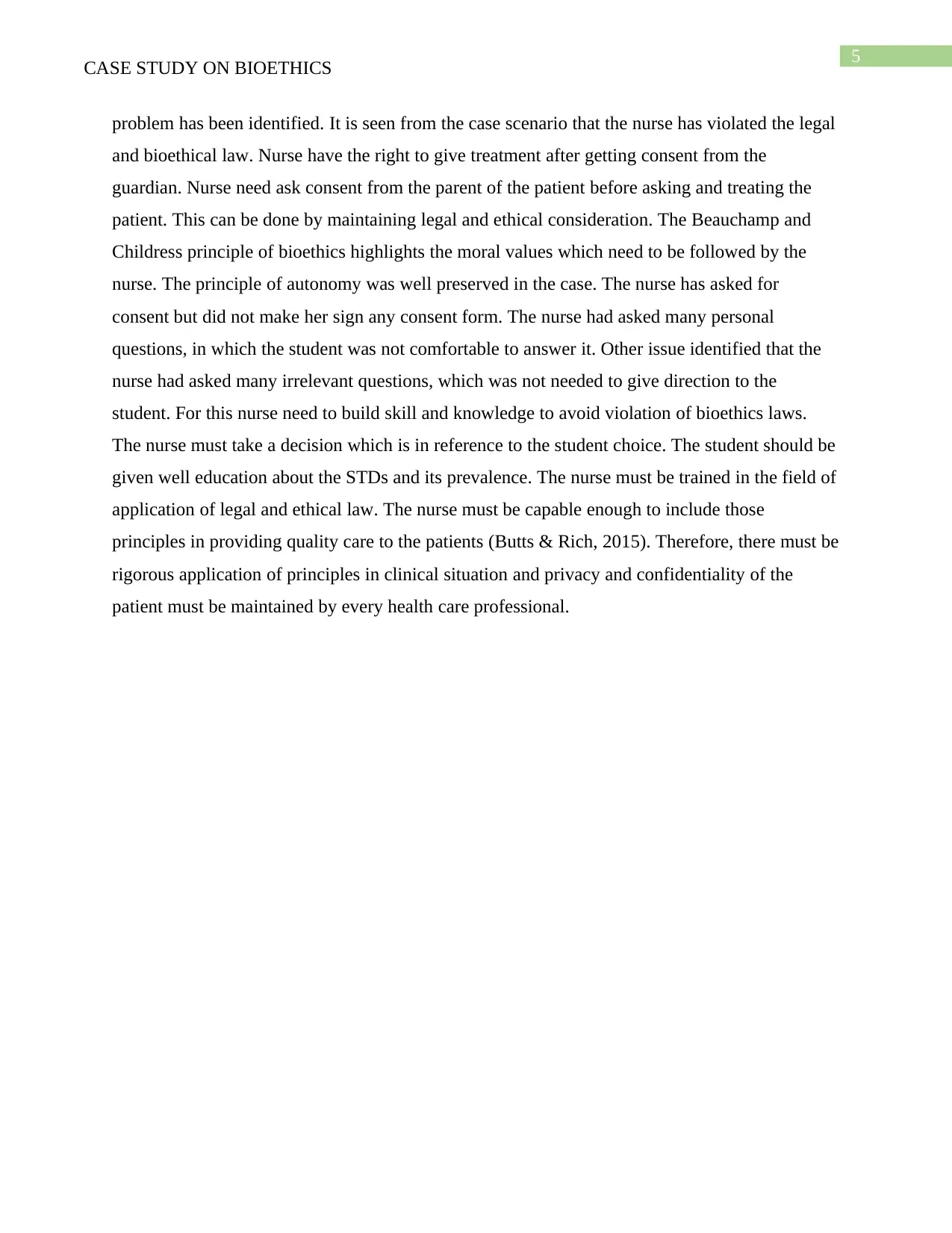
5
CASE STUDY ON BIOETHICS
problem has been identified. It is seen from the case scenario that the nurse has violated the legal
and bioethical law. Nurse have the right to give treatment after getting consent from the
guardian. Nurse need ask consent from the parent of the patient before asking and treating the
patient. This can be done by maintaining legal and ethical consideration. The Beauchamp and
Childress principle of bioethics highlights the moral values which need to be followed by the
nurse. The principle of autonomy was well preserved in the case. The nurse has asked for
consent but did not make her sign any consent form. The nurse had asked many personal
questions, in which the student was not comfortable to answer it. Other issue identified that the
nurse had asked many irrelevant questions, which was not needed to give direction to the
student. For this nurse need to build skill and knowledge to avoid violation of bioethics laws.
The nurse must take a decision which is in reference to the student choice. The student should be
given well education about the STDs and its prevalence. The nurse must be trained in the field of
application of legal and ethical law. The nurse must be capable enough to include those
principles in providing quality care to the patients (Butts & Rich, 2015). Therefore, there must be
rigorous application of principles in clinical situation and privacy and confidentiality of the
patient must be maintained by every health care professional.
CASE STUDY ON BIOETHICS
problem has been identified. It is seen from the case scenario that the nurse has violated the legal
and bioethical law. Nurse have the right to give treatment after getting consent from the
guardian. Nurse need ask consent from the parent of the patient before asking and treating the
patient. This can be done by maintaining legal and ethical consideration. The Beauchamp and
Childress principle of bioethics highlights the moral values which need to be followed by the
nurse. The principle of autonomy was well preserved in the case. The nurse has asked for
consent but did not make her sign any consent form. The nurse had asked many personal
questions, in which the student was not comfortable to answer it. Other issue identified that the
nurse had asked many irrelevant questions, which was not needed to give direction to the
student. For this nurse need to build skill and knowledge to avoid violation of bioethics laws.
The nurse must take a decision which is in reference to the student choice. The student should be
given well education about the STDs and its prevalence. The nurse must be trained in the field of
application of legal and ethical law. The nurse must be capable enough to include those
principles in providing quality care to the patients (Butts & Rich, 2015). Therefore, there must be
rigorous application of principles in clinical situation and privacy and confidentiality of the
patient must be maintained by every health care professional.
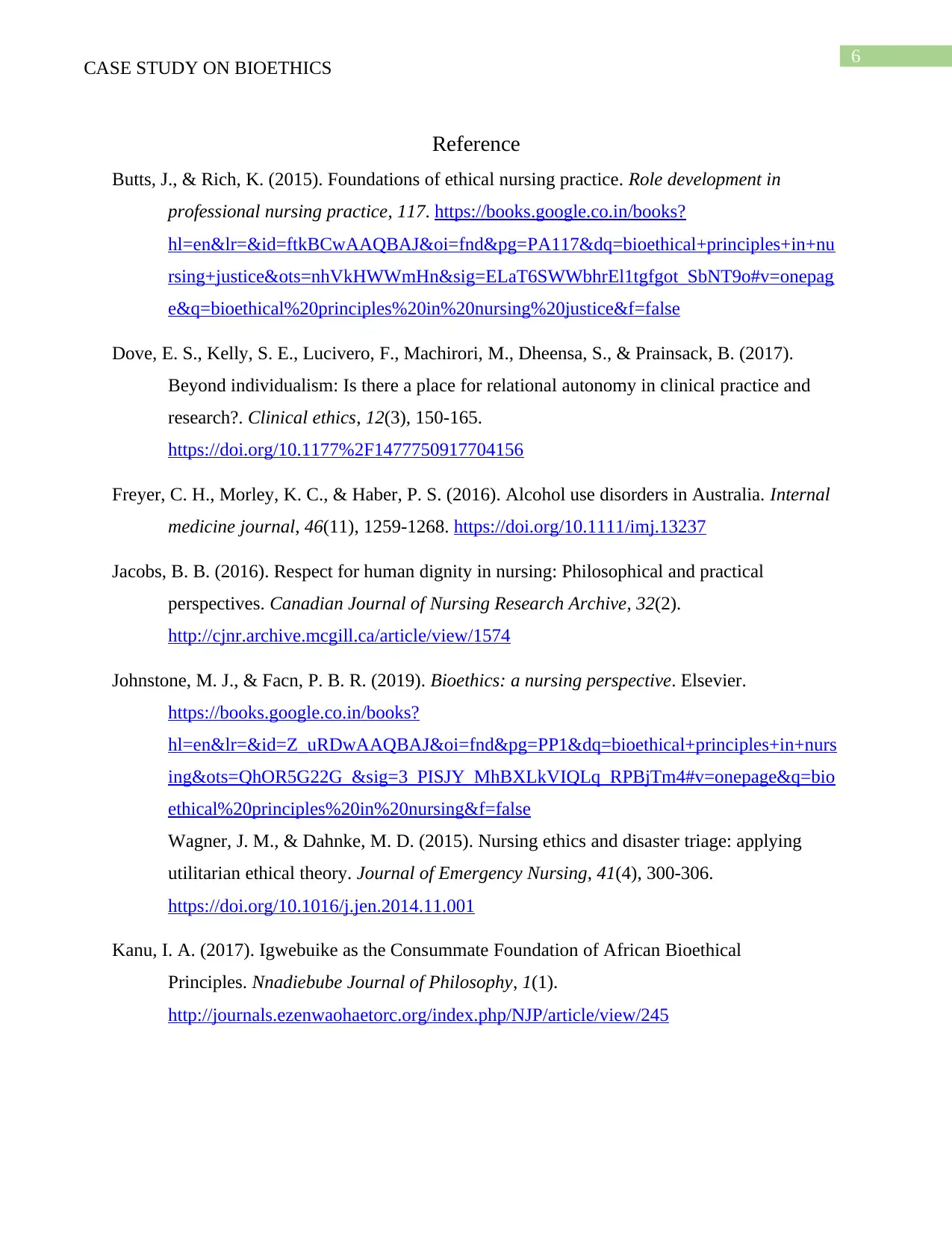
6
CASE STUDY ON BIOETHICS
Reference
Butts, J., & Rich, K. (2015). Foundations of ethical nursing practice. Role development in
professional nursing practice, 117. https://books.google.co.in/books?
hl=en&lr=&id=ftkBCwAAQBAJ&oi=fnd&pg=PA117&dq=bioethical+principles+in+nu
rsing+justice&ots=nhVkHWWmHn&sig=ELaT6SWWbhrEl1tgfgot_SbNT9o#v=onepag
e&q=bioethical%20principles%20in%20nursing%20justice&f=false
Dove, E. S., Kelly, S. E., Lucivero, F., Machirori, M., Dheensa, S., & Prainsack, B. (2017).
Beyond individualism: Is there a place for relational autonomy in clinical practice and
research?. Clinical ethics, 12(3), 150-165.
https://doi.org/10.1177%2F1477750917704156
Freyer, C. H., Morley, K. C., & Haber, P. S. (2016). Alcohol use disorders in Australia. Internal
medicine journal, 46(11), 1259-1268. https://doi.org/10.1111/imj.13237
Jacobs, B. B. (2016). Respect for human dignity in nursing: Philosophical and practical
perspectives. Canadian Journal of Nursing Research Archive, 32(2).
http://cjnr.archive.mcgill.ca/article/view/1574
Johnstone, M. J., & Facn, P. B. R. (2019). Bioethics: a nursing perspective. Elsevier.
https://books.google.co.in/books?
hl=en&lr=&id=Z_uRDwAAQBAJ&oi=fnd&pg=PP1&dq=bioethical+principles+in+nurs
ing&ots=QhOR5G22G_&sig=3_PISJY_MhBXLkVIQLq_RPBjTm4#v=onepage&q=bio
ethical%20principles%20in%20nursing&f=false
Wagner, J. M., & Dahnke, M. D. (2015). Nursing ethics and disaster triage: applying
utilitarian ethical theory. Journal of Emergency Nursing, 41(4), 300-306.
https://doi.org/10.1016/j.jen.2014.11.001
Kanu, I. A. (2017). Igwebuike as the Consummate Foundation of African Bioethical
Principles. Nnadiebube Journal of Philosophy, 1(1).
http://journals.ezenwaohaetorc.org/index.php/NJP/article/view/245
CASE STUDY ON BIOETHICS
Reference
Butts, J., & Rich, K. (2015). Foundations of ethical nursing practice. Role development in
professional nursing practice, 117. https://books.google.co.in/books?
hl=en&lr=&id=ftkBCwAAQBAJ&oi=fnd&pg=PA117&dq=bioethical+principles+in+nu
rsing+justice&ots=nhVkHWWmHn&sig=ELaT6SWWbhrEl1tgfgot_SbNT9o#v=onepag
e&q=bioethical%20principles%20in%20nursing%20justice&f=false
Dove, E. S., Kelly, S. E., Lucivero, F., Machirori, M., Dheensa, S., & Prainsack, B. (2017).
Beyond individualism: Is there a place for relational autonomy in clinical practice and
research?. Clinical ethics, 12(3), 150-165.
https://doi.org/10.1177%2F1477750917704156
Freyer, C. H., Morley, K. C., & Haber, P. S. (2016). Alcohol use disorders in Australia. Internal
medicine journal, 46(11), 1259-1268. https://doi.org/10.1111/imj.13237
Jacobs, B. B. (2016). Respect for human dignity in nursing: Philosophical and practical
perspectives. Canadian Journal of Nursing Research Archive, 32(2).
http://cjnr.archive.mcgill.ca/article/view/1574
Johnstone, M. J., & Facn, P. B. R. (2019). Bioethics: a nursing perspective. Elsevier.
https://books.google.co.in/books?
hl=en&lr=&id=Z_uRDwAAQBAJ&oi=fnd&pg=PP1&dq=bioethical+principles+in+nurs
ing&ots=QhOR5G22G_&sig=3_PISJY_MhBXLkVIQLq_RPBjTm4#v=onepage&q=bio
ethical%20principles%20in%20nursing&f=false
Wagner, J. M., & Dahnke, M. D. (2015). Nursing ethics and disaster triage: applying
utilitarian ethical theory. Journal of Emergency Nursing, 41(4), 300-306.
https://doi.org/10.1016/j.jen.2014.11.001
Kanu, I. A. (2017). Igwebuike as the Consummate Foundation of African Bioethical
Principles. Nnadiebube Journal of Philosophy, 1(1).
http://journals.ezenwaohaetorc.org/index.php/NJP/article/view/245
Paraphrase This Document
Need a fresh take? Get an instant paraphrase of this document with our AI Paraphraser
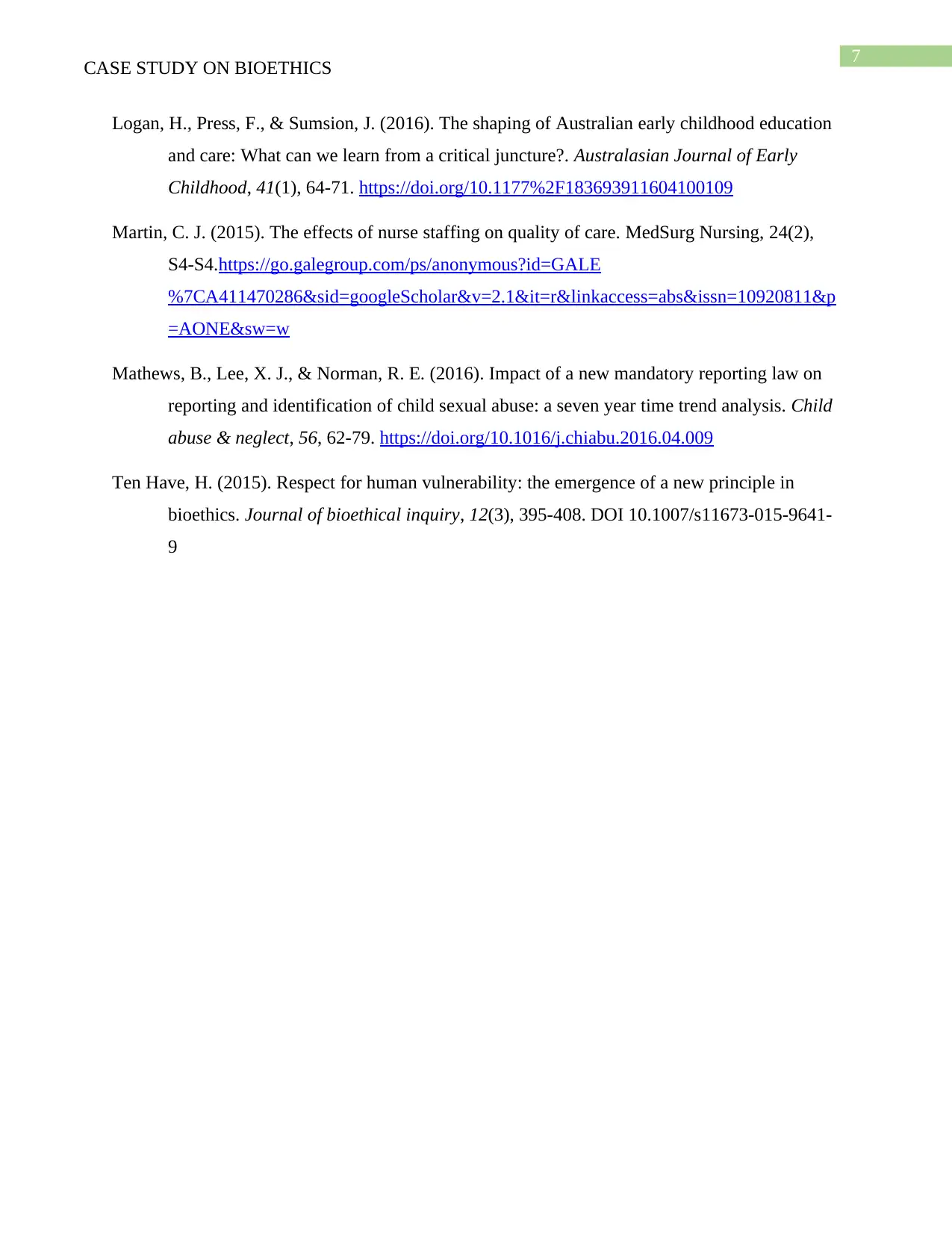
7
CASE STUDY ON BIOETHICS
Logan, H., Press, F., & Sumsion, J. (2016). The shaping of Australian early childhood education
and care: What can we learn from a critical juncture?. Australasian Journal of Early
Childhood, 41(1), 64-71. https://doi.org/10.1177%2F183693911604100109
Martin, C. J. (2015). The effects of nurse staffing on quality of care. MedSurg Nursing, 24(2),
S4-S4.https://go.galegroup.com/ps/anonymous?id=GALE
%7CA411470286&sid=googleScholar&v=2.1&it=r&linkaccess=abs&issn=10920811&p
=AONE&sw=w
Mathews, B., Lee, X. J., & Norman, R. E. (2016). Impact of a new mandatory reporting law on
reporting and identification of child sexual abuse: a seven year time trend analysis. Child
abuse & neglect, 56, 62-79. https://doi.org/10.1016/j.chiabu.2016.04.009
Ten Have, H. (2015). Respect for human vulnerability: the emergence of a new principle in
bioethics. Journal of bioethical inquiry, 12(3), 395-408. DOI 10.1007/s11673-015-9641-
9
CASE STUDY ON BIOETHICS
Logan, H., Press, F., & Sumsion, J. (2016). The shaping of Australian early childhood education
and care: What can we learn from a critical juncture?. Australasian Journal of Early
Childhood, 41(1), 64-71. https://doi.org/10.1177%2F183693911604100109
Martin, C. J. (2015). The effects of nurse staffing on quality of care. MedSurg Nursing, 24(2),
S4-S4.https://go.galegroup.com/ps/anonymous?id=GALE
%7CA411470286&sid=googleScholar&v=2.1&it=r&linkaccess=abs&issn=10920811&p
=AONE&sw=w
Mathews, B., Lee, X. J., & Norman, R. E. (2016). Impact of a new mandatory reporting law on
reporting and identification of child sexual abuse: a seven year time trend analysis. Child
abuse & neglect, 56, 62-79. https://doi.org/10.1016/j.chiabu.2016.04.009
Ten Have, H. (2015). Respect for human vulnerability: the emergence of a new principle in
bioethics. Journal of bioethical inquiry, 12(3), 395-408. DOI 10.1007/s11673-015-9641-
9
1 out of 8
Related Documents
Your All-in-One AI-Powered Toolkit for Academic Success.
+13062052269
info@desklib.com
Available 24*7 on WhatsApp / Email
![[object Object]](/_next/static/media/star-bottom.7253800d.svg)
Unlock your academic potential
© 2024 | Zucol Services PVT LTD | All rights reserved.





